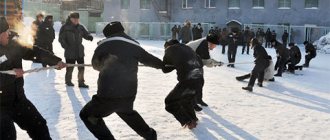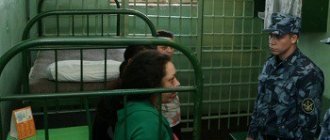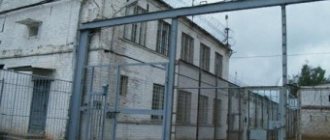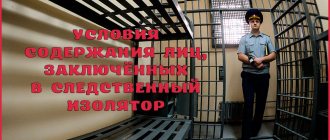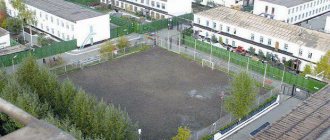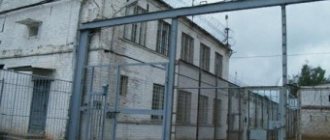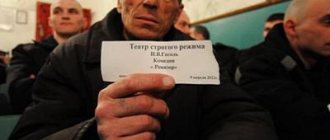For many citizens, the concepts of “correctional colony”, “pre-trial detention center” and “prison” are one and the same. And in a sense, this is really so, because all of these are places of deprivation of liberty in which convicts serve their sentences. However, these names are far from synonymous. Each of them characterizes a separate correctional institution, which has its own characteristics.
To understand how a prison differs from a colony and a pre-trial detention center, we should take a closer look at the features of correctional institutions. We'll talk about this below.
What is a prison
We are talking about one of the types of correctional institutions. The prison looks like a brick building (or several buildings) containing cells for convicts. In addition to the premises intended for holding prisoners, the prison also has a library, a first-aid post, visiting rooms, etc.
The following persons are serving sentences in prison:
- Men who have committed serious crimes and have been sentenced to 5 or more years.
- Prisoners who violated the order of serving their sentences in other correctional institutions were transferred to prison.
In prisons, prisoners are kept in two regimes: general and strict. Those prisoners who have violated the rules of stay in a correctional institution can be transferred to the latter. A convict can be transferred back provided that he has spent at least a year in a strict regime.
According to general rules, disabled people of groups 1 and 2 cannot be transferred to a strict regime.
In prisons, prisoners are kept in both general locked cells and solitary confinement. Convicts cannot move freely around the territory of the correctional institution.
The placement of prisoners is subject to certain rules. So, separately from each other are placed:
- women and men;
- healthy and sick;
- adults and not;
- those convicted for the first time and those who are serving a sentence for the second time or more;
- held under general and strict regime;
Persons transferred from another correctional institution and left in prison to perform household work are also housed separately. Repeat offenders (we are talking about persons who have committed especially dangerous crimes), as well as prisoners sentenced to life, are required to serve their sentences separately from everyone else.
While in general custody, a prisoner can enjoy the following privileges:
- 4 dates annually;
- 2 parcels and 2 parcels per year;
- daily walk, lasting up to 2 hours (can be increased by half an hour for good behavior).
In strict mode the following is allowed:
- no more than one parcel and one parcel per year;
- two short dates per year and one long one;
- The duration of the daily walk is one and a half hours with the possibility of extension by 30 minutes.
Thus, the prison is the most isolated institution with the greatest number of restrictions.
Who is contained in them?
The distribution of all convicts between colonies is carried out by the courts, which prescribe the punishment. The general regime is considered more lenient, so it can be assigned to the following categories of convicts:
- Violators of the disciplinary regime who previously lived in colony settlements.
- People who have received a criminal record for the first time, but the crime itself is considered serious and committed intentionally.
- Teenagers who have reached adulthood and served their sentences in a children's colony.
- Adult citizens who have committed an intentional act before the age of 18 , which is grave or especially grave.
- Women who intentionally committed crimes. They only get here for serious, especially serious acts. Even if they relapse, criminals are sent to this regime.
- Other convicts with less severe crimes who received a second sentence for recidivism.
The essence of this separation of all criminals is to ensure that the most dangerous people to society are kept separately from the rest of the criminals who pose the least danger. Although in practice, such institutions often contain different categories of convicts. It can be very difficult to restore your worldview and improve your life after such a period in life. Therefore, many have been returning for several years.
Colonies
There are educational and correctional colonies. Moreover, the latter are divided into 4 types:
- settlement colonies;
- general regime;
- special regime;
- strict regime.
Educational colonies
In educational colonies they contain those persons who have not reached the age of majority. In general, criminals under the age of 19 can be found here. Prisoners serve their sentences here under ordinary, light, preferential and strict conditions.
Those prisoners who have just entered a correctional institution find themselves in normal conditions. The exception is those persons who have previously served a sentence. If the convict is a persistent violator of discipline, then he is subject to a strict regime. Also, persons who have committed intentional crimes while serving their sentence are kept in such conditions.
If the prisoner demonstrates good behavior, works conscientiously or studies well, then he is transferred to lighter conditions. If the prisoner is preparing for release, he can be transferred from easier conditions to preferential ones.
A correctional colony differs from a prison in that it has short terms of detention. For example, the punishment for juvenile offenders who break the law before reaching their 16th birthday can be no more than 6 years in prison. Serious crimes are punishable by no more than 10 years in prison.
The main task of the educational colony is the correction of prisoners. By placing juvenile criminals in such an institution, they can be protected from the influence of seasoned bandits and repeat offenders.
Have a question for a lawyer? Ask now, call and get a free consultation from leading lawyers in your city. We will answer your questions quickly and try to help with your specific case.
Telephone in Moscow and the Moscow region: +7
Phone in St. Petersburg and Leningrad region: +7
Free hotline throughout Russia: 8 (800) 301-39-20
There is a psychological service on the territory of educational colonies. Its employees help teenagers rehabilitate.
Unlike prison, the conditions of detention in educational colonies are more lenient (even if we are talking about strict conditions). The cells are closed only at night. During the day, juvenile prisoners can move freely around the territory of the institution. The colony itself looks like a hostel.
Correctional colonies
Modern correctional colonies offer three modes of serving sentences:
- general;
- strict;
- special.
Only adult criminals can enter a correctional colony. New convicts, as well as those persons who, due to various reasons, were transferred from other conditions of detention are included in the general regime.
While in a general regime colony, prisoners can enjoy the following privileges:
- up to 10 dates per year;
- 6 parcels and parcels annually;
- accommodation outside the colony on holidays, weekends, during visits with the child (subject to good behavior).
Those prisoners who are kept in lighter conditions have more rights. They can claim 12 dates per year, 12 parcels and parcels. The number of dates on holidays and weekends is not limited.
Strict conditions require prisoners to be kept in locked rooms. Every day, convicts are taken out for an hour and a half walk. Provided good behavior, the time spent in the fresh air can be increased to three hours. 6 short and 6 long visits are also allowed annually.
Thus, the general mode is considered the softest. On the territory of the correctional colony there is a store, a laundry, a canteen, a first-aid post, a library, and dormitories for prisoners. All these buildings are surrounded by barbed wire and fences.
What distinguishes a correctional colony from a prison is the following:
- various conditions of detention;
- in a colony, prisoners have more rights;
- the colony is more like a hostel, where prisoners are allowed to move freely around the territory.
Terms of transfer
During the sentencing, the judge independently determines the type of colony where the convicted person will serve his sentence. Therefore, initially the majority of adult criminals who have committed intentional crimes end up here. In terms of their severity, they are usually considered grave or especially grave. Because many convicts, whose guilt was established in the form of negligence, are serving such a sentence in colony settlements.
If the crime was committed with additional aggravating circumstances, then in most cases strict conditions are imposed.
The usual conditions can be obtained in the following ways:
- If a person was arrested before he was sentenced , then this term will be counted towards the total amount of time served. But this condition is met only if no violations of discipline were recorded during this period, for which a punishment cell is assigned.
- After six months of being in a general regime, a prisoner can apply for favorable conditions. To do this, he must show his conscientious attitude to work and discipline.
- If the offender violates discipline , his conditions will be changed to strict ones. A reverse transfer is allowed only after six months.
- When a person is transferred to another institution, he receives the same conditions as he had before the transfer.
As statistics show, all prisoners are divided into 2 main types:
- some of them completely deny the established discipline , therefore they prefer to serve the entire sentence under strict conditions;
- others, on the contrary, try to get easier conditions in order to further reduce their time in this institution.
Therefore, the general regime is a starting point for prisoners in one of the directions.
Pre-trial detention center
The abbreviation SIZO stands for “pre-trial detention center.” Those persons who are suspected or accused of committing a crime are placed here. A detention order must be issued against the offender - only in this case can he be placed in a pre-trial detention center.
The main purpose of placement in a pre-trial detention center is to attempt to restrict the suspect's freedom of movement and contact with the outside world. While in a pre-trial detention center, a person will not be able to escape, bribe witnesses, threaten the victim, etc.
Let's consider the key features of the pre-trial detention center:
- Convicts are kept in locked premises, and therefore the possibility of their free movement around the territory of the pre-trial detention center is excluded.
- The isolation ward is not intended to house prisoners on a permanent basis. This is its main difference from prison. The accused is placed in a pre-trial detention center for the duration of the investigation. Here people are held before the trial, as well as during the court hearing, awaiting the final verdict.
Other modes
In addition to strict, general and prison regimes, the Criminal Code provides for at least three more, each with its own characteristics:
- special in a correctional colony - clause 6 of Article 74 of the Penal Code of the Russian Federation, Article 124 of the Penal Code of the Russian Federation;
- regimes of the educational colony - clause 3 of Art. 74 Penal Code of the Russian Federation, Art. 132 Penal Code of the Russian Federation;
- colony-settlement regime - clause 9 of Art. 74 of the Penal Code of the Russian Federation, Article 128 of the Penal Code of the Russian Federation.
Only citizens who have reached the age of criminal responsibility for a crime, but have not reached the age of majority, are sent to educational colonies. Conditions of detention are divided into preferential, light, strict and ordinary. Only persons sentenced to life imprisonment, as well as those who have committed a particularly dangerous recidivism, qualified in accordance with Article 18 of the Criminal Code of the Russian Federation, are placed in a special regime penal colony.
As in all correctional colonies, the conditions of detention include a light, strict and normal regime. They are sent to colony settlements for unintentional crimes or crimes of moderate severity , as well as by transfer from third-party correctional institutions on the basis of Article 78 of the Penal Code of the Russian Federation.
What is the difference between a prison and a maximum security colony?
The conditions of detention of prisoners in a maximum security colony are in many ways similar to those in prison. In both cases, prisoners are kept in closed premises without the opportunity to move freely around the territory of the correctional institution. In both cases, convicts have the right to a daily walk in the fresh air. The differences between these institutions are as follows:
- Only male criminals who have received at least 5 years of imprisonment can go to prison. Also, those who violated the conditions of their stay in the penal colony are sent here. Persons who have committed serious crimes and repeat offenders are placed in a maximum security colony.
- Being in a strict regime, prisoners of a colony have more rights than people held in prison. Here, prisoners are given more time for walks, they can see family more often, receive more packages per year, and spend more on shopping at the local store.
It should be understood that prison is the last resort where convicts are sent. This includes those persons who have committed serious crimes or repeatedly violated the law.
The prison has the most stringent conditions of detention. However, with good behavior, prisoners can count on a relaxation of the regime. In addition, a conscientious prisoner who has no conflicts with the administration can be released early.
Conditions of detention
It is important not to confuse the conditions of detention that may be provided within an institution with such a regime. There may be 4 types of conditions provided, depending on the discipline and behavior of the person:
- ordinary , they are assigned in most cases, and in the future, based on the behavior of the criminal himself, they can be changed;
- strict ones are prescribed in cases where the convict does not want to adhere to the established rules in the colony;
- lightweight ones are appointed as a reward for conscientious work and good behavior;
- preferential, are issued in the last six months so that a person can be rehabilitated in the outside world outside the colony.
You can learn more about this in the presented video.
General terms
Prisoners live in special dormitories, where each room has several beds. In addition, they gain the following abilities under normal conditions:
- Spend personal funds within 9,000 rubles for your needs, strictly established by law . This amount is controlled by the administration of the institution, and it is set for a month. Unspent limits expire and are not transferred to other months.
- The right to short meetings with your friends and family. The number of such meetings should not exceed 6 times during the year. In addition, they are given the right to long meetings up to 4 times.
- Relatives and friends can send 6 parcels and 6 parcels. This limit is also set for a year.
In addition to the basic conditions, additional conditions may be considered for each convicted person in accordance with his personality and behavior. If there are children, a convicted person with good discipline can obtain two visits with the child on a monthly basis. Such meetings can be lengthy and not held on the territory of the colony. But leaving the municipality is prohibited. But they can rent an apartment and spend the weekend together.
Lighter conditions
Compared to regular conditions, light regime gives more advantages to the prisoner, so many strive to get it. In this case, the prisoner continues to live in the dormitory, but he is provided with the following opportunities:
- Spend monthly funds for permitted purposes without restrictions .
- Meet with family and friends 12 times a year , taking into account that 6 of them will be long meetings.
- 12 parcels and 12 parcels from your family and friends .
In this case, the parent is also given an additional opportunity to meet with their children outside the territory of the institution, but without leaving the municipality. Only the number of such meetings is not limited. The boss may refuse to grant a meeting, but to do this he will have to write a reasoned resolution. Therefore, in most cases, if the convicted person complies with all the regimes, he can use such meetings at his own discretion.
Six months before the end of the established sentence, such a convicted person may be transferred to preferential terms. Then he will receive the right to work outside the institution, as well as live on the territory of a municipal facility.
As an alternative, it is possible to keep the convicted person with those who have the right to be without an escort. They can live with their families on their own property.
Strict conditions
The opposite regime is strict if the prisoner ignores the rules established in the colony. Such criminals are kept in special closed premises. They have the following rights:
- The ability to spend only 7,800 rubles per month on your needs.
- During the year, have only 6 meetings , 3 of which can be long.
- 3 parcels and 3 parcels from your family and friends .
- Get a daily opportunity to walk in the fresh air for 1.5 hours . But this time can be increased to 3 hours if the convicted person shows good discipline.
Institutions with general regime are considered the most loyal to adult prisoners. The least dangerous criminals are sent here.
What is strict mode
In accordance with Article 74 of the Penal Code of the Russian Federation, a strict regime is assigned to those persons who meet the following criteria:
- convicted for the first time;
- male;
- committed crimes of particular gravity;
- the maximum sentence is 10 years.
Also, a criminal who is repeatedly prosecuted may end up in a maximum security colony. In this case, the court does not take into account crimes committed by a citizen before reaching the age of majority. The nuances of qualifying recidivism of crimes are specified in Article 18 of the Criminal Code of the Russian Federation.
The provisions of the Executive Code of the Russian Federation prohibit placing females under strict regime. Alternative punishments are chosen for them.
Conditions and procedure for serving the sentence
The conditions of detention of prisoners in maximum security colonies are specified in Articles 122 and 123 of the Penal Code of the Russian Federation. There are three possible options here:
- Normal conditions. They are applied to persons who are admitted to a correctional colony for the first time and have no previous criminal experience. Also, normal conditions can be applied to those prisoners who were kept in light conditions, but violated the established regime.
- Lighter conditions. Such conditions of detention apply to those persons who have no disciplinary violations. After serving at least 9 months in a strict regime, a prisoner can switch to a light regime.
- Strict conditions. Those people who have significant violations are kept here.
Let's take a closer look at the features of being in lightweight conditions:
- prisoners live in dormitories;
- 4 short and 4 long visits per year are allowed;
- monthly expenses are allowed not exceeding 9,000 rubles (you can buy food and essentials);
- a prisoner can annually receive up to 6 parcels weighing 5 kg, and up to 6 parcels weighing 20 kg.
Normal conditions include:
- accommodation in dormitories;
- maximum monthly expenses – 7800 rubles;
- 3 short and 3 long dates per year;
- 4 large transfers (up to 20 kg) and 4 transfers up to 5 kg per year.
Strict conditions include the following restrictions:
- prisoners live in closed premises and are under supervision;
- maximum amount of expenses – 7200 per month;
- no more than two long and two short visits per year;
- daily walk, lasting 2-3 hours;
- no more than two parcels weighing 20 kg and two parcels weighing 5 kg per year.
If a citizen was transferred to a maximum security colony from another correctional institution, he will continue to serve his sentence under the conditions that were initially established for him. A change in conditions of detention is possible after 9 months of being in a maximum security colony.
In addition
What is the difference between a strict regime and a general regime? This question is most often of interest to those citizens whose loved ones and acquaintances, by the will of fate, find themselves in places of isolation from society. So, under normal conditions, general regime prisoners can spend the funds in their accounts in the amount of no more than three minimum wages within one year. On the strict level it is even stricter - no more than two times the minimum wage. Thus, prisoners must eat mainly the food they are offered in the canteen.
In addition, when serving a sentence in a general regime colony, convicts have the opportunity to receive only four long-term visits and 6 short-term ones. On the strict level there are even fewer - only three of each type during the year. It should also be noted here that visits are granted mainly to close relatives. Although, with the permission of the head of the colony, even an “unofficial” spouse or friend can see the convicted person. Those who are planning to visit a convicted person in a colony need to know about this.
It must also be said that when comparing general and strict regimes, there is a difference even in the number of transfers that a prisoner can receive. After all, everywhere has its own conditions and procedures. In addition, most PSs adhere to the norms of current legislation.
If in a general regime a prisoner can receive six parcels and 6 parcels within one year, then in a strict regime - only four of each type. Thus, the differences here are very significant.
